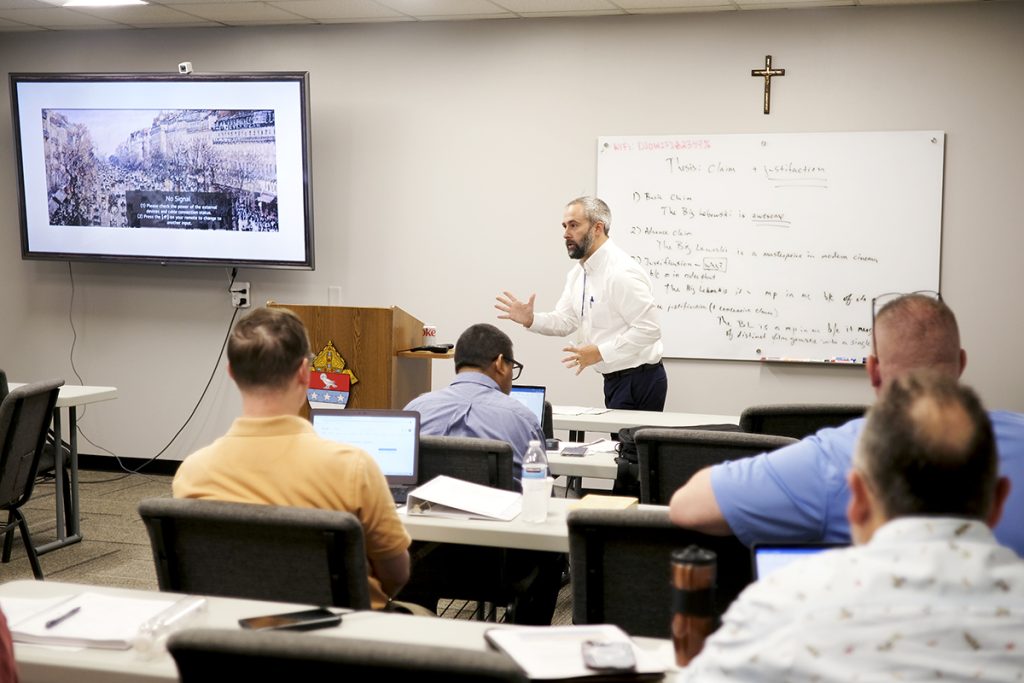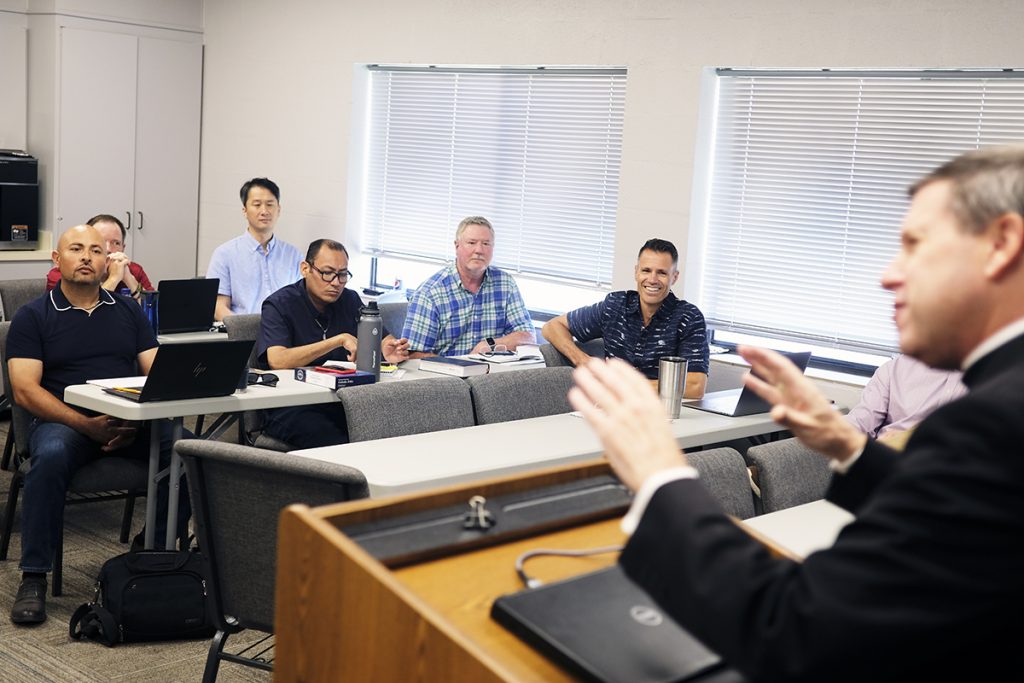
Eight years ago, Michael Medlin, took a huge step in his journey of faith when he was brought into full communion with the Catholic Church at the Easter Vigil. Something he never expected to happen.
“I was pretty unhappy with the different denominations I was a part of on the Protestant side. I found a lot of them quite unfulfilling and not terribly intellectual, so I had given up on church in a lot of ways,” explained Medlin, a parishioner of St. Rose of Lima Church in Murfreesboro. “Then, my daughter was having some problems in her middle school, and we put her into a Catholic high school in Ohio, and it completely changed our life.
“She started inviting me to Mass at school, and I thought, ‘What is this about’ because it was so different from anything I’d ever experienced in church before,” he said. “I just started reading more and going to Mass more and learning about the history of the early Church, and I thought, ‘This is answering so many questions for me that I’ve had my entire life.’ This was a fullness of the faith that I’d never experienced.”
Four years later, another unexpected thing occurred, as he began to feel God calling him to the permanent diaconate. Now, after years of contemplation as he waited for the right time in his career and family life, Medlin is one of 13 men in the newest cohort preparing for the permanent diaconate, which officially began formation classes the weekend of Aug. 25-27 at the Catholic Pastoral Center.
The other 12 men include: Porfirio Alfaro, Kent Brown, Philip Brown, Dave Balbarada, Joseph Cho, Rocky Conner, Rod Foster, Neftali Garcia, Josh Kubly, Bob Pruitt, Julio Vado, and Don Weller.
It officially marks the third class of the new four-year program, for which the Office of Vocations partners with St. Meinrad Seminary and School of Theology for the basic structure of the program as well as for much of the academic instruction, explained Father Luke Wilgenbusch, director of vocations.
The 13 men in the current class continues the trend of dedicated candidates seen in past cohorts. The first cohort, who were ordained this past spring, also included 13 men. The second cohort, currently two years into their formation, includes eight men.
Having so many men discerning a call to the diaconate, “it’s an exciting step for our diocese. It tells us that there is a culture of service and vocation in our diocese, that there are these men who believe that they’re called or at least that they should discern the call, and who are willing to give themselves away radically,” said Father Wilgenbusch.
“Deacons fulfill an important role and are able to assist the priests in a unique way. The deacon is not just a volunteer or an extra help. He is a cleric and a minister, and he sacrifices himself in a really radical way that goes beyond the ordinary gift of time and energy that most people are able to offer,” he continued.
“Deacons are also given special preparation so that they can assist at a deeper level, especially in things like catechetical instruction and in formation. Because of their ordination, they can also assist sacramentally in things like baptisms, weddings, and even in giving homilies on occasion.”
The official start of classes came following an extensive application process, which included several interviews, including with Father Wilgenbusch and Bishop J. Mark Spalding, family visits, a full psychological assessment, background checks, and physicals.
“In addition to being an important vetting tool to making sure our candidates are well-equipped for a possible call to the diaconate, the application process is also a discernment tool,” Father Wilgenbusch explained. “By answering those questions and having those conversations, the men are deepening their own discernment and inviting the Church to discern along with them.
“A call to the diaconate, just like a call to the priesthood, always involves a mutual discernment between a man and the Church,” he said. “Just as he has to recognize his own call, the Church has to look and confirm that call with him in order for him to know that he’s really being called to this ministry.”

Candidates had varying thoughts about the application process.
“It was very thorough and detailed, and it brought me back to points or times in my life that were not highlights and could make one feel as if we are not good enough to do God’s work,” explained Kent Brown, a parishioner of Good Shepherd Church in Decherd. “It’s through His amazing grace and His forgiveness that all of us should feel empowered to be priests, prophets, and kings by our baptism and our repentance. Thanks be to God.
“Now, I pray that I can just confirm that the call that I feel is God’s wish and will and that I can conform my will to His.”
“I had the time of my life,” added Cho, a parishioner of the Church of the Korean Martyrs, of the application process. “It allowed me to get to the bottom of myself and look into all around me, and I appreciated the chance to address those questions about myself. Every step of this has been a blessing to me, and I’m happy that I have a chance to be part of this program.”
Medlin said it required a lot of soul-searching and introspection.
“I consider myself a fairly introspective person, but it was far beyond what I had done before. So there were times that I went, ‘Man, I don’t know if I’m the right person for this,’” he explained, noting his 27-year career in law enforcement that led to him being put in many dangerous situations over the years, as well as being a witness to many heartbreaking situations. “I’ve lived a very different life than a lot of these men, and I’ve wondered, ‘Do I have the right kind of background to be able to minister to others?’”
“But I know now, this is where I need to be,” Medlin added. “Now, I just want to continue to learn and grow in the faith and just be around good men and try to be better in all aspects of my life and prepare myself to be of service to others.”
With the application process complete, the men now enter four years of formation. During the first year, they’re known as aspirants.
“During that one year, they’re really supposed to focus intensely on their discernment,” Father Wilgenbusch explained. “We always tell them they can’t know for sure they’re called to the diaconate until they enter into the formation program and discern in that context.
“At the end of the year, they’re supposed to confirm their discernment of the diaconate, and, if that is God’s call for them, they go on retreat and receive the rite of candidacy,” he said. “The remaining three years are the candidate path and official preparation for the diaconate.”
The full formation process includes 12 hours of instruction per month, which is completed over a weekend, for 10 months out of the year, Father Wilgenbusch explained. The men are also required to obtain a Master of Theology degree from St. Meinrad, an additional 18 credit hours, which is completed on their own time.
Bishop Spalding visited the new cohort on Saturday, Aug. 26, to offer a few words of encouragement.
“When we look at the history of the Church, we, a lot of times, see ourselves being reflected back at us,” Bishop Spalding said. “We’re all on one pilgrimage through time, on a pilgrimage ultimately to eternity. It’s so wonderful that you’re going to help people along that way.
“The more you understand your own self journey, your own history, your own life, the history of the life of the Church, then you can stand more easily with and for others,” he added. “Once you’re ordained, you’re not just you. You’re a minister of the Church, you’re clergy.”
And that day will come quicker than they realize, he said.
“I say this to the seminarians all the time, and I’ll say it to you. In all days of formation, the days can be long, but the years are short,” the bishop said. “You’ll blink an eye and find yourself standing there ready to walk up an aisle saying, ‘How did I get here?’ It really does happen in such a short time, so learn as much as you can, and know of our prayers for you.”









